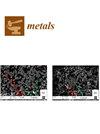Mechanical, Corrosion and Wear Characteristics of Cu-Based Composites Reinforced with Zirconium Diboride Consolidated by SPS
IF 2.5
3区 材料科学
Q3 MATERIALS SCIENCE, MULTIDISCIPLINARY
引用次数: 0
Abstract
This study aimed to investigate the physical, mechanical, corrosion, and tribological properties of Cu-based composites with varying zirconium diboride content. The composites were successfully consolidated using spark plasma sintering (SPS) at temperatures of 850 °C and 950 °C and a pressure of 35 MPa. The effect of the ZrB2 content and the sintering temperature on the properties of the Cu-based composites was investigated. Scanning electron microscopy (SEM), electron backscatter diffraction (EBSD), and X-ray diffraction were used to analyse microstructure evolution in copper matrix composites. Microhardness tests were used to evaluate mechanical properties. Wear behaviour was evaluated using a ball-on-disc method. Corrosion properties were estimated on electrochemical tests, such as potentiodynamic polarisation. The results demonstrated an enhancement in the density and porosity of the composites as the sintering temperature increased. A uniform dispersion of ZrB2 was observed in the copper matrix for all composites. With an increase in the content of the ZrB2 reinforcement phase, there was an increase in microhardness and an improvement in the wear resistance of the sintered composites. A reduction in densification and corrosion resistance of Cu-based composites was observed with increasing ZrB2 content.用二硼化锆增强的铜基复合材料的机械、腐蚀和磨损特性
本研究旨在探讨二硼化锆含量不同的铜基复合材料的物理、机械、腐蚀和摩擦学特性。复合材料在 850 ℃ 和 950 ℃、35 兆帕压力下采用火花等离子烧结(SPS)工艺成功固结。研究了 ZrB2 含量和烧结温度对铜基复合材料性能的影响。扫描电子显微镜(SEM)、电子反向散射衍射(EBSD)和 X 射线衍射被用来分析铜基复合材料的微观结构演变。微硬度测试用于评估机械性能。使用球盘法评估了磨损性能。腐蚀性能通过电化学测试(如电位极化)进行评估。结果表明,随着烧结温度的升高,复合材料的密度和孔隙率都有所提高。所有复合材料中的 ZrB2 都均匀地分散在铜基体中。随着 ZrB2 增强相含量的增加,烧结复合材料的显微硬度有所提高,耐磨性也有所改善。随着 ZrB2 含量的增加,铜基复合材料的致密性和耐腐蚀性降低。
本文章由计算机程序翻译,如有差异,请以英文原文为准。
求助全文
约1分钟内获得全文
求助全文
来源期刊

Metals
MATERIALS SCIENCE, MULTIDISCIPLINARY-METALLURGY & METALLURGICAL ENGINEERING
CiteScore
4.90
自引率
13.80%
发文量
1832
审稿时长
1.5 months
期刊介绍:
Metals (ISSN 2075-4701) is an open access journal of related scientific research and technology development. It publishes reviews, regular research papers (articles) and short communications. Our aim is to encourage scientists to publish their experimental and theoretical results in as much detail as possible. Therefore, there is no restriction on the length of the papers. The full experimental details must be provided so that the results can be reproduced. Metals provides a forum for publishing papers which advance the in-depth understanding of the relationship between the structure, the properties or the functions of all kinds of metals.
 求助内容:
求助内容: 应助结果提醒方式:
应助结果提醒方式:


